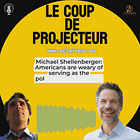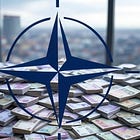NATO: From Brain Death to Implosion
The Transatlantic Alliance is unraveling. The blame lies with Europe’s leaders, whose intransigence allowed Donald Trump—exasperated but shrewd—to outmaneuver them.
Talk the talk? Now, walk the walk. Such is, in essence, the message Donald Trump conveyed in his “letter to all NATO nations.”
The Europeans’ inability to listen—not even to understand, merely to listen—is beyond measure.
Donald Trump campaigned on ending foreign wars. Two months after he took office, in March 2025, our colleague Michael Shellenberger made the same point: Americans have had enough of playing the world’s policeman.
If the war in Ukraine has yet to be resolved, the blame lies with Zelensky, the Europeans, and Washington’s “war party.” What is striking in Trump’s post is that he already treats the United States as no longer part of NATO. He addresses the “NATO nations” from the outside, as though the Atlantic Alliance were something foreign to America.
The U.S. president forces the Europeans to cope. You want America to impose heavy sanctions on Russia? Then first stop buying Russian oil and gas, and levy punitive tariffs on China. The trap—into which Europe’s leaders complacently walked back in 2022, dependent as they were, in varying degrees, on Washington for their positions—has now closed. Trump drives the logic to its extreme, because it suits his interests, above all for domestic politics motives.
Europe cannot dispense with Russian oil and gas without literally tanking its own economies—already in dire straits because of the ineffective sanctions imposed on Moscow. In Germany, 125,000 industrial job cuts have been announced in just the past six weeks. France’s credit rating has been downgraded from AA to A, the result of the disastrous mismanagement of our Parisian elites, incapable of curbing the state’s lavish spending.
Trump delivers a brutal return to reality, reminding Europe that Russia will still be there tomorrow, that European trade depends heavily on China, and that sooner or later a modus vivendi must be found. And that Europe must stop waiting for benevolent foreign powers to indulge a continent as self-absorbed as it is now politically weightless.
Washington’s demand that NATO members devote at least 5% of their GDP to military spending is not merely about selling American weapons and equipment. Trump had already pressed for such an increase during his first term. An integrated military alliance such as NATO does indeed require a fairer sharing of the burden, if only for operational reasons. Apart from France—and even then, only on a limited scale—no NATO member today can sustain its own logistics. And as General Walter Bedell Smith, Eisenhower’s wartime chief of staff, famously put it: “Amateurs talk strategy; professionals talk logistics.” When one considers NATO countries’ inability to manufacture even basic ammunition or maintain adequate stockpiles, that maxim rings truer than ever.
In both operational intelligence and command-and-control infrastructure, everything still rests on the United States.
Another fundamental problem is NATO’s strategic subordination to the narrow national interests—and entrenched Russophobia—of minor states such as the Baltic republics and Finland, all of which were on the wrong side of history during the Second World War, and Poland, which has yet to absorb history’s lessons and persists in its paranoia, incapable of grasping that its own interests also require stable relations with Russia.
This unacceptable subordination has even seeped into the EU itself: first through the appointment of Estonia’s Kaja Kallas as head of the fuzzy “European diplomacy,” then through the creation of a European Commissioner for Defense—a post now held by a Lithuanian, despite defense not being an EU competence. Figures whose worldview is so narrow it scarcely extends beyond the border of their respective country with Russia. And now, there is talk of exploding the EU’s debt levels to fund defense spending in the name of a Russian threat so illusory that Brussels must manufacture it.
NATO is not merely a military alliance. It is a supranational organization which, during the Cold War, orchestrated major political interference in the domestic affairs of numerous countries—Italy, Greece, and France among the first. Since the fall of the Berlin Wall, it has continually fabricated enemies in order to justify its own existence. It does so autonomously, often in contravention of the interests of most of its member states.
In 1999, the chosen bogeyman was Serbia, bombed for 78 consecutive days on the basis of a colossal falsehood: the Racak massacre in Kosovo, which never took place. The intervention was carried out in support of a supposed rebellion, the KLA—a movement that was, in reality, nothing more than a mafia militia. Kosovo, a rump state of 1.6 million inhabitants, has since become, along with Bosnia, a rear base of Islamism in Europe and a hub of illicit trafficking. For 25 years, it has cost European taxpayers some €500 million annually, without any visible improvement in the living conditions of its people.
From 2001 onward came the “war on terror,” and we all saw just how much NATO, through ISAF, contributed to improving the situation in Afghanistan. For eight years, it was held in check by a few tens of thousands of insurgents in sandals and salwar kameez, armed with nothing more than AK-47s.
In Ukraine, since 2003, NATO has played a destabilizing role that, through one escalation after another, ultimately led to Russia’s intervention in 2022—a war that Ukraine and its Western sponsors have lost, bringing with it the destruction of the country. Quite an achievement.
It is NATO’s enlargement itself that lies at the root of Europe’s geopolitical destabilization. And from this destabilization comes the stark proof of NATO’s utter ineptitude: its inability to cope with the very crises it creates.
NATO is also a machine for standardizing military equipment, designed to turn Europe into a captive market for the United States. It is, in itself, a military-industrial complex. We have already reported on the vast corruption scandal within its central procurement agency, the NSPA, which manages an annual budget of €7 billion while also handling tenders on behalf of numerous member states. The case in question involves several hundred million euros, particularly in contracts for naval fuel and ammunition.
Supranationalism is a failure fully realized. As our colleague Thomas Fazi rightly observes, it has considerably weakened all the member states of the EU. Supranationalism is an ideology whose implementation has achieved the remarkable feat of making the whole less than the sum of its parts. It precludes effective responses to crises, which demand decoupled and decentralized approaches, given how divergent the interests and structural realities are. Convergence, in truth, is nothing more than a chimera.
The same applies to NATO. In a multipolar world, the logic of blocs is obsolete. French forces have no business in Estonia, Poland, or Romania. France’s greatest risk of conflict does not lie in the Baltic Sea. It lies not to the East, but in the Mediterranean, where an aggressive Turkey is funding its military expansion through Qatar. Let us not forget that it was not the Russians who “illuminated” a French frigate in 2020, but the Turks—NATO members—without any condemnation from the other EU countries. In the Mediterranean, the migration crisis poses far greater risks to France’s national security than anything Russia could exert today.
If the countries of the Baltic region perceive Russia as a threat, it is up to them to organize accordingly. They bear the responsibility of maintaining, through diplomacy, peaceful relations with their mighty neighbor. Just as with migration, it is intolerable that countries not directly affected by the crisis—and controlling none of the EU’s borders—should dictate policy to those on the front lines: Cyprus, Greece, Italy, Spain, and France.
From both a military and economic perspective, the regional level is the appropriate level of response. The European Union, as a subsidiary of NATO, only exacerbates tensions. The EU feeds on crises—sometimes even provoking them—to justify its existence in its current dysfunctional supranational form.
The bloc logic being sold to public opinion is nothing more than the product of outdated minds trapped in the Cold War era. Above all, it serves to induce crises as a pretext for ever greater European integration—something neither the peoples nor public opinion desire. Meanwhile, false accusations continue to be made, psychological operations are carried out to manufacture enemies that do not exist, and genuine conflict risks are neglected. A recent example: the claims of Romanian President Nicosur Dan, who attempted to convince the whole wide world that Russia had conducted 85,000 cyberattacks—you read that correctly—despite the fact that Romania does not even have 85,000 viable targets.
As for electoral disinformation, we know it was funded by the Romanian Liberal Party—a misstep that backfired spectacularly. Moreover, numerous studies, primarily American, have shown that social media has only a negligible impact on election outcomes. Who, aside from the “elites,” is foolish enough to believe that social media—or the media in general—creates reality?
Ukraine is nothing more than a bloody regional conflict, yet the Biden administration and its European allies have sought to elevate it into a global confrontation in the name of a “rules-based international order,” with the sole purpose of weakening Russia and provoking a regime change there. It was only because of the Russiagate affair—a manipulation orchestrated by Hillary Clinton’s campaign and certain factions of the U.S. security and intelligence apparatus, designed to make it appear that Russia had interfered in the 2016 election to favor Donald Trump—that Russia’s provocation could be orchestrated by the Biden administration, NATO, the EU, and Ukraine.
Trump’s administration has only one objective: to resolve the conflict in Ukraine before next year’s midterm elections. This will happen, with or without Europe, just as Ukraine will be neutralized—either at the negotiating table or on the battlefield.
In any case, Europe alone will bear responsibility for Ukraine’s defeat and will pay the price for the as flawed as it was cynical calculation of weakening Russia with Ukrainian blood. Europe will once again inherit a rump state: mafioso, in ruins, and with part of its population ultra-radicalized and seeking vengeance. Unable to take it out on Russia, which has won the war, they will turn their wrath on those who armed, trained, and led them to massacre—the very powers they will see as traitors. It will soon become clear that arming extremists is never a wise choice.
Since European leaders have been doing everything possible since 2016 to undermine the sitting U.S. president—including adopting the DSA, which was designed as an indirect tool to censor the American public—the cost they will impose through their incompetence and anti-Russian obsession on the entire European population will be immense.







